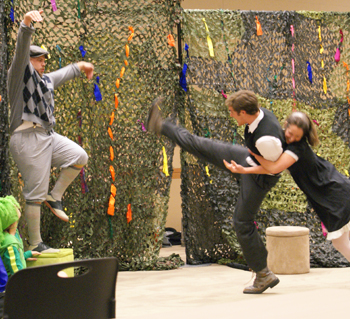 Last Monday I attended the Nebraska Shakespeare troupe’s presentation of “A Midsummer Night’s Dream” in the Sorrell Center.
Last Monday I attended the Nebraska Shakespeare troupe’s presentation of “A Midsummer Night’s Dream” in the Sorrell Center.
Because my department helped coordinate the performance and because I edit the campus newsletter, I attended out of a sense of obligation.
I stayed because I laughed. A lot.
Turns out the play is jam packed with humor and the cast had the skills and comedic timing to make the production a rollicking affair.
“Make sure you give this a good review in the newsletter,” said Carmen Sirizzotti, division director of UNMC employee relations, after the show. Her eyes seemed a bit red from tears of laughter.
 |
Members of the Nebraska Shakespeare troupe perform “A Midsummer Night’s Dream” last week in the Sorrell Center’s Truhlsen Events Center. The performance drew waves of laughter and rave reviews from those who attended. |
All of which got me thinking about the importance of taking breaks during the workday.
I can’t tell you how many times I have walked away from a seemingly insurmountable pile of work for a lunch meeting with friends or some other kind of enjoyable break only to return to work refreshed and more productive.
I also know there have been many occasions where I have foregone lunch in the name of productivity only to end up grinding gears because I simply needed a breather.
Turns out providing such a breather was just what the thinking of the administrators who brought the Shakespeare event to campus.
“It’s been said many times that laughter is great medicine and I think that was proved again during the presentation of ‘A Midsummer Night’s Dream’ in the Sorrell Center,” said John Gollan, M.D., Ph.D., dean of the College of Medicine and a Nebraska Shakespeare board member.
Providing such a break also is one of the motivations behind the monthly Music as Medicine series that’s held in the Durham Outpatient Center Atrium and the partnership events UNMC hosts along with the Durham Museum and Joslyn Art Museum.
“Music and the arts . attend to the human spirit,” said John Benson, M.D., a UNMC professor of internal medicine who heads up the Music as Medicine series. “In the fast-paced, high-technology, critical-impact environment of an academic health center, music and the arts can create a restorative atmosphere.”
|
|
“Studying for six, eight or 10 hours straight with no breaks is not the most efficient way of doing things, yet many do this,” Dr. Carver said. “In the workplace, we also tend to work too long without breaks.”
Dr. Carver encourages students to take frequent breaks while studying, about 10 to 15 minutes every two hours or so. He encouraged employees to take advantage of their scheduled break times, too.
“Many of us tell ourselves we can’t afford to take a break because we’re too busy,” Dr. Carver said. “But the fact is, and research has shown, that we’re actually more productive when we do take that break.
“When you come back, you’re often able to get more done in less time than before because you’re refreshed.”
A walk outside or taking the time to read something enjoyable over one’s lunch hour are examples of ways people can take a break and refresh.
Adding some humor to one’s day also is helpful, Dr. Carver said, noting that those of us who attended the Shakespeare production got a double shot of wellness because we got a break from the workplace combined with an intense dose of laughter.
“These concerts, plays and other activities really are healthy things for us here on campus,” Dr. Carver said. “They help prevent burnout and promote a happier, more efficient workplace.”